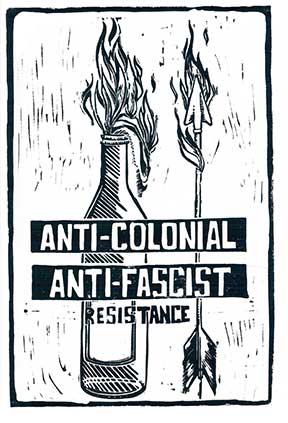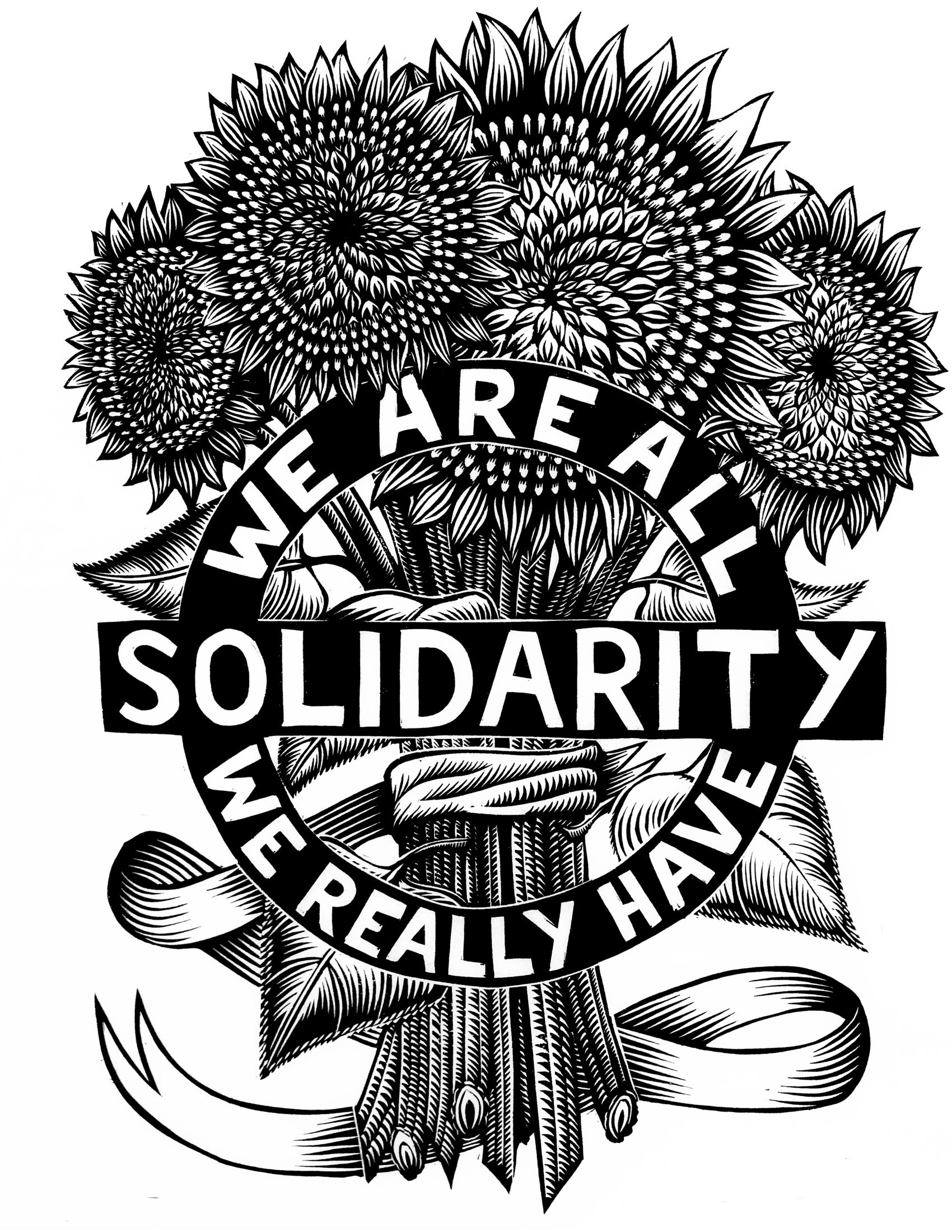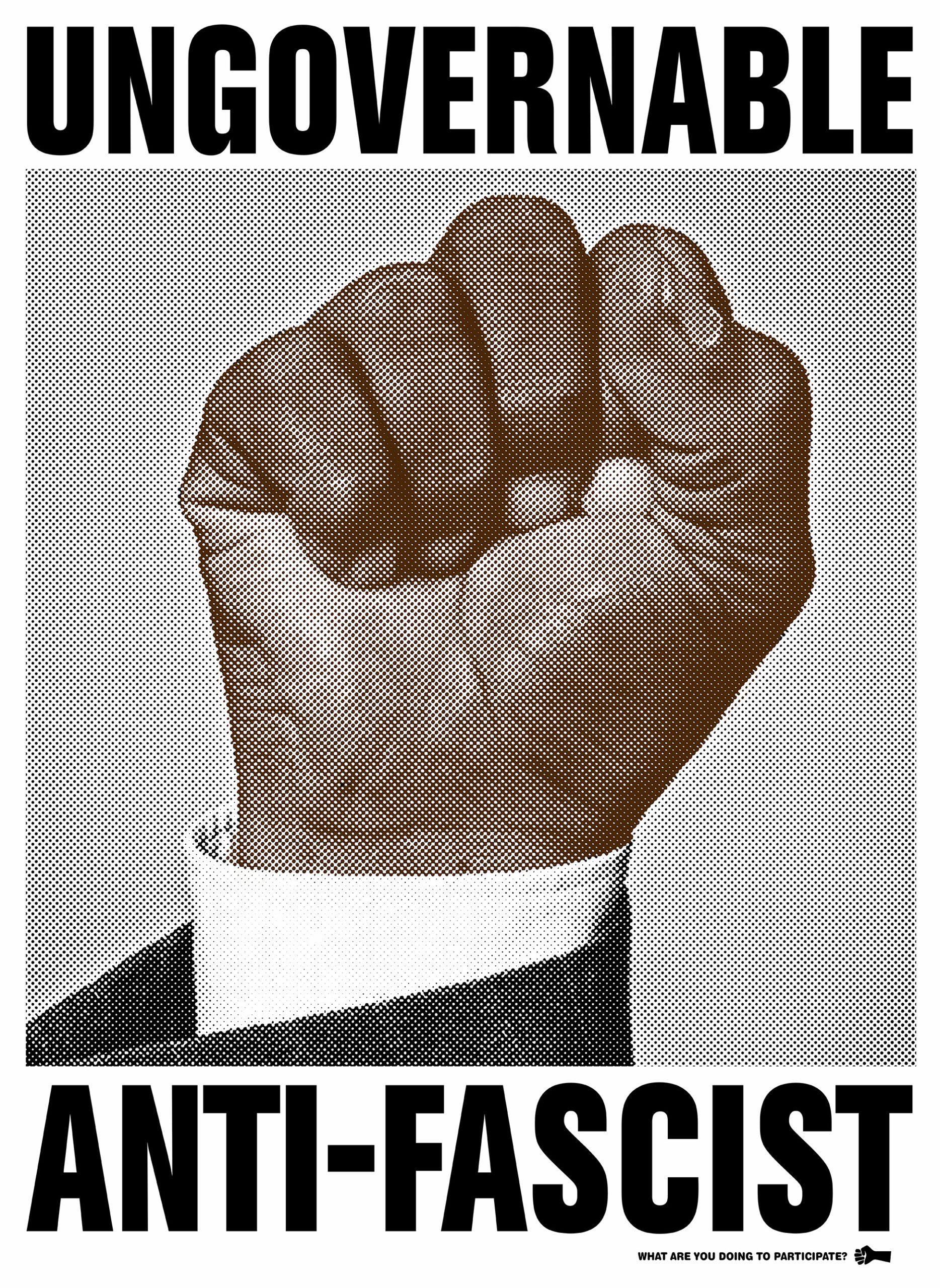The Beyond Anti-Fascism, But Not Without It statement was circulated in December, 2017, generating a number of both positive and negative responses.
Positive responses include Hillary Lazar’s piece, Connecting Our Struggles: Border Politics, Antifascism, and Lessons from the Trials of Ferrero, Sallitto, and Graham, in the forthcoming print issue of Perspectives on Anarchist Theory (N.30, “Beyond the Crisis”), as well as other writing we’ll be sharing on-line soon.
Negative responses included critiques that the call was, a) being improperly essentialistic about identity politics and b) disregarding the fact that some of the white men writing about fascism/anti-fascism are Jewish and therefore it was insulting to say they don’t understand the history of fascism.
In light of these responses, we have rewritten the statement and are including it in the new print issue of Perspectives on Anarchist Theory. Below you’ll find this new version, followed by a reflection on how we got from the original to this one, and what we still find inadequate and needing in our discussions of fascism and anti-fascism. And here we really want to encourage you to use our comments section for discussion, or send us your thoughts to be considered for posting on-line.

Beyond Anti-Fascism, but Not Without It
Since Trump’s election, fascism has barged on to center stage, moving more brazenly into public space, mainstream media and public discourse than it has in decades. This renewed and emboldened presence of overt fascism has been met by an explosion of analysis and discussion about its history and politics, as well as the conditions necessary for its emergence. In equal proportion, growing attention is also being paid to the history and politics of anti-fascism. This anti-fascist response is welcome, and it is crucially needed.
Meanwhile, women, queer and trans people, and communities of color (particularly Black and Indigenous communities) who have been experiencing related forms of violence and raw hate for years have had full cognizance of the implications. Yet their analysis and resistance has not been accorded the same urgency and attention—even keeping in mind the major tectonic shifts initiated by Black Lives Matter and the Indigenous blockade movement against fossil fuel pipelines, as exemplified by Standing Rock.
When the first great global anti-fascist Popular Front emerged in the 1930s, Pan-Africanists and Asian anti-colonialists pointed out to their white leftist comrades and allies that what appeared unprecedented and alarming to them when it reared its head in Europe had long been familiar to those on the wrong side of the color line. The logics of white supremacy, and its institutions and systematized practices—including the brutal dehumanization (racialization, criminalization) of the “Other” and violent misogyny—had all been routine components of the apparatus of colonization, conquest, and dispossession. Thus, those logics, rhetorics and practices had merely continued along their obvious trajectories by blossoming into fascism at home, where the shock was that they appeared close by and that they visited upon “us,” rather than acting far away, upon “them.”
Black and brown revolutionaries declared (and proved) themselves ready and eager to step up and join the fight against fascism, while also insisting that these connections not be overlooked: that if Hitler, Mussolini and Franco were confronted without simultaneously dismantling the British and French empires and the US racial regime, then the whole enterprise would be fatally flawed. Perhaps the present resurgence shows that they were right.
So what about now? What comparable connections need to be stated and foregrounded?
We need analysis and historical contextualization of fascism and anti-fascism, but we also need analysis and historical contextualization of their relationship to longstanding anti-racist resistance and decolonization efforts. Some of this has been done, but we need to pay more attention to this and further develop it. We need to talk about how institutionalized forms of white supremacy connect to the racism and imperialism of US world interventions, which in turn connect to systematic police murders and the mass incarceration of poor people and people of color. In order to provide a fuller perspective, and therefore a more effective ability to fight back, we need to understand what’s different and distinct about the present moment, while also understanding its intersections and continuities. We need to hear more from those who have never stopped experiencing, recognizing, calling out and fighting back against the not-so-dormant forces that have produced this latest crop of malevolent fascist blossoms.
We should appreciate those who have already laid out their analyses; they are essential to our struggle. Nevertheless, we also need to hear from the rest of the comrades, organizers, writers, and everyday folks. This is happening, and we want to amplify it. (For example, check out the work of Alexis Pauline Gumbs, Dilar Dirik, William C. Anderson and Zoé Samudzi, Robyn Spencer, the Upping the Anti collective, among others. We also refer readers to the work of Black anarchists such as Ashanti Alston, Lorenzo Kom’boa Ervin, Walidah Imarisha, and Kuwasi Balagoon.)
If you are writing, talking, and speaking out publicly and you want another forum for what you have to say, write us at PerspectivesonAnarchistTheory@gmail.com. Whether you have only an idea, a rough draft that needs work, or a fully formed and polished piece, we’d like to see what you’re thinking and consider it for publication. Send it to us!
~ Perspectives on Anarchist Theory collective, Institute for Anarchist Studies
While writing, disseminating, reflecting on, and rewriting the Beyond Anti-Fascism call has been a collective effort, the first draft and original conceptualization for it was done by Perspectives collective member Maia Ramnath. Maia would like to address the objections to the original call, and speak to the reflections generated by them here:
“Yes, I stated that some connections weren’t being made, at least publicly, in the most publicized anti-fascist talks and writings, and reviews of those writings. I had observed this directly, for example having attended such talks in which the speaker on the history of anti-fascism admirably presented the material within his stated parameters, and also pled ignorance or unpreparedness to address connections to other struggles that exceeded those parameters when audience members pointed out or raised questions about those things, namely anti-colonial struggles or anti-racist struggles outside the European and North American experience. I’m not trying to shame anyone; I took this side-stepping to be done in good faith and ethical circumspection. The friendly critiques being offered by these questioners, and by the Beyond Anti-Fascism statement, were arguments for addition, not replacement; for intersectional connection, not zero-sum correction. I don’t understand how suggestions for adding more voices should be taken as a dismissal of existing voices (did the objectors miss the “but not without it” part?).

Roger Peet)
I wish to rebut the objections on two counts.
First, to talk about identity: are people seriously saying that it’s wack to suggest that progressives/leftists/anarchists/anti-fascists with a commitment to full emancipatory aspirations should continually attend, in all our work, as part of the process of our work, to redressing the ongoing imbalances in who gets to speak? Or that anyone subjected to one modality of oppression gets a pass on also attending to other modalities of oppression? Surely that’s pretty basic and non-controversial by this point. As is what I would think would be a pretty basic and non-controversial observation that such imbalances are based not in essential identity but in historically realized institutions and material structures of oppression which we are not done dismantling.
Secondly, to talk about content: they are even missing the point I was making about content, and about historicization, by misidentifying the connection I was flagging. I was not faulting anyone for missing the connection between today’s neo-fascism, white nationalism and white supremacy with earlier 20th century forms of fascism, anti-semitism and Nazism. That’s obvious, and abhorrent. Rather, I was trying to foreground the connection between (European and North American) fascism and colonialism/imperialism, both then and now—echoing the connections made since the 1930s-40s by the likes of W.E.B. DuBois, Aime Cesaire and Hannah Arendt among others—in order to foreground its more contemporary manifestations. Maybe everyone who gives a shit should sit down for an in-depth critical discussion of Cesaire’s Discourse on Colonialism plus Arendt’s On the Origins of Totalitarianism. Actually, that could be fun and useful.Anyway, not to get all cheesy-inspirational, but the point is: If we all did a better job of uncovering these connections, and acting upon them, our ability to fight together…rather than fighting each other, or fighting for only some of us … against all modes of racism, white supremacy, Aryan supremacy, ethno-nationalism, anti-semitism, and anti-Blackness, would be much strengthened. That way the uplift of any sector of people (in a struggle for resources) would be conceived as directly rather than inversely proportional to that of any other, and we could quit kicking the can of unfinished liberation down the road.”

